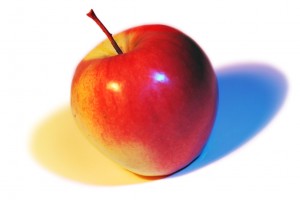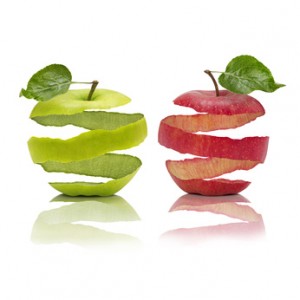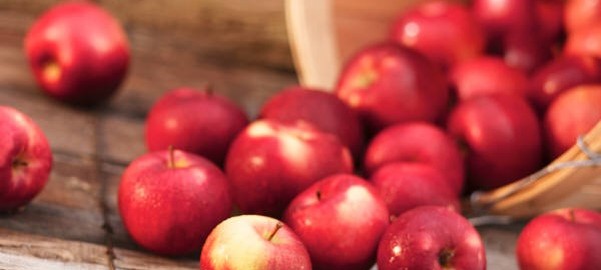Sweet, crisp, versatile, and robust are attributes that make apples a favorite fruit. The nutritional benefits of apples have been touted since medieval times, and the old English saying “Ate an apfel avore gwain to bed Makes the doctor beg his bread” is still popular, but better known as “An apple a day keeps the doctor away.” Research is lending support for this expression, as recent studies are revealing that apples may help protect against a number of chronic conditions.
 If you typically eat the same variety of apple, consider trying a new kind. There are more apple varieties on record than for any other food (about 7,500), making this fruit one of the more varied on the planet. In the US, about 100 varieties are grown commercially. Although the choice at most supermarkets may be limited, visit a Farmer’s Market or specialty produce store to discover the many different flavors this fruit has to offer.
If you typically eat the same variety of apple, consider trying a new kind. There are more apple varieties on record than for any other food (about 7,500), making this fruit one of the more varied on the planet. In the US, about 100 varieties are grown commercially. Although the choice at most supermarkets may be limited, visit a Farmer’s Market or specialty produce store to discover the many different flavors this fruit has to offer.
Treasure the Apple Peels
 Apple consumption is linked to a reduced risk of many chronic health problems. Research shows that the peel contains most of the beneficial phytochemicals believed to be responsible for the “apple-a-day-keeps-the-doctor-away effect.”
Apple consumption is linked to a reduced risk of many chronic health problems. Research shows that the peel contains most of the beneficial phytochemicals believed to be responsible for the “apple-a-day-keeps-the-doctor-away effect.”
In addition to being a good source of fiber, apples are rich in antioxidants and other protective compounds. Not only does the peel account for about 75 percent of an apple’s dietary fiber, but also about two-thirds of an apple’s antioxidants are found in its peel.
Many recipes call for peeling apples, but if you skip this step, you’ll save time, and add more protective compounds to your dish.
Cornell University researchers isolated biologically active components from apple peels and identified a group of compounds with “potent” anticancer effects. These compounds, called triterpenoids have been found to inhibit or kill cancer cells in laboratory cultures.
Ursolic acid is another compound in apple peels that may have health-promoting properties: preliminary research showed that ursolic acid might prevent muscle atrophy associated with aging. Mice fed ursolic acid had increased muscle mass and were leaner, with lower levels of blood glucose, cholesterol and triglycerides (a follow-up study showed increases in brown fat as well).
Apples are a rich source of soluble fiber, which can help lower cholesterol levels. This in turn is thought to reduce the risk of heart disease. One study suggested that an apple a day could reduce deaths from heart disease and strokes about as well as statins. The soluble fiber in apples supports the growth of “friendly” gut bacteria, which play an important role in supporting the immune system.
Other potential benefits of apples may include reducing the risk of metabolic syndrome, diabetes, stroke, dementia, obesity, and increasing exercise endurance, through the activity of a flavonoid in apple peels called quercetin.
Although apples are healthful, it’s best to limit apple juice, because it is a concentrated source of sugar with little fiber and it is much lower in protective compounds. Also, the fruit will fill you up more than juice, which can help you control your calorie intake.
 Enjoying Apples
Enjoying Apples
Apples are perfect to eat out of hand and a popular lunchbox fruit, but you can incorporate this fruit into many meals. Chop them into your morning oatmeal, add them to salads, or bake them into a fruit crisp.
This Apple Walnut Cake is all about apples. . . and you’ll be hard pressed to find a more delicious cake with such healthful ingredients. Boasting the nutrients of 3 cups of apples, the healthy Omega-3 fats of walnuts, whole wheat flour, and just enough sugar for optimal sweetness, you can enjoy this nutritious treat as a breakfast bread, a nourishing snack, or a light dessert.
Here are some other great apple recipes to inspire you.
Wondering about the best way to select, store, and prepare apples? Check out these tips.
__________
This article was adapted from Food for Thought: Healing Foods to Savor, a Cookbook and Food Guide I wrote with Vicky Newman, MS, RDN.
Share This:
